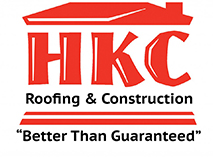Repair Options for a Shingled Roof
The storm winds were blowing and the shingles were flying. Or maybe that giant oak-tree in your neighbor’s yard decided to shed a heavy branch directly over your living room. There’s no avoiding it, you are faced with the decision of whether to patch or replace your damaged shingled roof.
Making such a big financial decision can be intimidating, but understanding the pros and cons of each repair option will ensure that you make the right call in protecting your greatest investment.
Patching
The first and cheapest option is simply replacing a small section of your roof. This may be the best option if your roof is relatively new, and you are confident that it is otherwise in great shape. To guarantee that this repair looks natural you should install the exact same style and color of shingle used on the rest of your roof. That’s why we recommend our clients order extra shingles every time their roof is replaced. This will ensure that the shingles match exactly.
However, if your current roof has changed color due to sun exposure and weather, a repair made with new shingles will be visible from the street. Although the difference in color may be an eyesore, patching your roof in this way might be your most cost efficient repair option.
Partial vs Complete Re-roofing
If the damage is limited to one side of the roof, a partial re-roofing is also an option. Replacing only one side of your roof will certainly be cheaper overall when compared to replacing the entire roof. Replacing an entire section of the roof will make repairs less obvious, as minor color differences between the various faces of your roof won’t be as noticeable.
Partial re-roofing does carry its own set of problems. For example, an asphalt roof more than two layers thick will need to be entirely stripped before the shingles can be replaced. This usually results in a lopsided roof where the older sections are elevated a few inches above the new section.
NOTE: Many Insurance companies will not replace a roof that has been patched.
Another drawback to partial re-roofing is the cost. While partial re-roofing may be cheaper in the short term, you will be paying more per square foot of repair. Regardless of the size of the repair, a contractor will still have to pay for scaffolding, waste disposal, cost estimation, and more. Often the best financial decision is to simply replace the entire roof while the workers are on site, rather than in sections over the course of a few years.
An additional benefit to a complete re-roofing is the opportunity to examine the entire roof-deck for signs of damage or rot. Imperfections in the roof-deck can lead to water damage in the internal structure of your home. A damaged roof-deck also increases the risk of full or partial collapse of the roof.
Catching and fixing these problems early will save you from more costly repairs down the road. Depending on the age and condition of your roof, a complete replacement is often a wise investment, even when the visible damage appears small.
Two Layers vs Tearing Off Old Shingles
Should you decide to replace the entire roof, you may have the option of layering new shingles down over the old ones. Layering shingles is typically less expensive, but there are many reasons to remove the old shingles before re-roofing.
If your roof already has two layers of shingles, layering will not be an option. This is because the weight of three or more layers of shingles can compromise the structural integrity of your home. Stripping the shingles down to the roof-deck will also allow you to install a layer of ice and water shield. This barrier can save you from a costly headache down the road, and can only be applied to a bare roof-deck.
Even if your roof only has one layer of shingles, it may still be wise to strip them, as shingles will last longer and are more secure when fastened directly to the roof-deck. Again, your decision will come down to short term savings versus long term security.
Closing Thoughts
Regardless of whether you decide to patch, partially replace, or completely replace your roof, ensuring that the job is done correctly and thoroughly the first time will ultimately help save you money in the long term.








